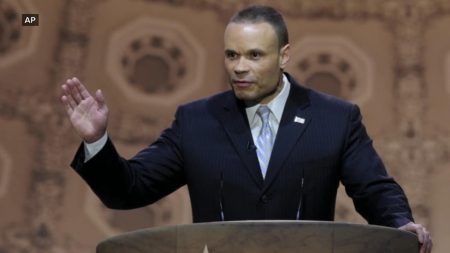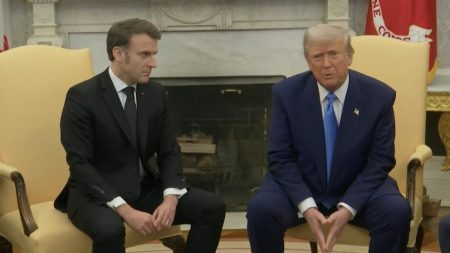A Personal Crisis: The Toll of USAID’s Shutdown on a Foreign Service Officer
In a heart-wrenching affidavit filed Monday night, a U.S. foreign service officer, identified only as Terry Doe, shared a harrowing account of how the Trump administration’s sudden and chaotic dismantling of USAID has imperiled the life of his pregnant wife and unborn child. The officer, stationed overseas, painted a vivid picture of the emotional, financial, and logistical challenges that have spiraled into a life-threatening emergency for his family. "My wife is 31 weeks pregnant," Doe explained, "after years of infertility and $50,000 of personal investment in countless fertility treatments." The strain of the administration’s "rushed, haphazard" shutdown has pushed his wife to the brink, with repeated hospitalizations for stress-related complications and life-threatening conditions. The officer’s affidavit underscores the human cost of bureaucratic decisions, revealing how the turmoil within USAID has cascaded into a personal tragedy.
Doe detailed how the shutdown has disrupted their lives, describing the relentless stress and uncertainty caused by the administration’s actions. "Because of the stress and strain of the constant onslaught by my employer in recent weeks, my wife has repeatedly been in the hospital with a life-threatening condition and stress-related complications," he wrote. The situation grew even more dire when a local physician and the embassy’s medical unit recommended a medical evacuation for his wife, only to have the State Department deny the request twice. The reason provided was stark: "there is no USAID funding for medivacs." This callous response left the family in a desperate situation, with no clear path to safety. It wasn’t until an unidentified U.S. senator intervened on their behalf that the evacuation was finally approved—but by then, the damage was done. Doe’s wife began hemorrhaging and was hospitalized at their overseas post, where she remains as of Monday.
The Bigger Picture: Systemic Failures and Human Consequences
The affidavit filed by Terry Doe is not an isolated incident but part of a broader pattern of systemic failure within USAID under the Trump administration. The agency’s rushed and disorganized shutdown has created a ripple effect, impacting not just Doe’s family but hundreds of foreign service officers and their loved ones. Randall Chester, the vice president of a union representing thousands of these officers, filed a separate affidavit Monday, challenging claims made by Peter Marocco, the acting deputy director of USAID. Chester disputed Marocco’s characterization of the evacuation of USAID employees from the Democratic Republic of the Congo (DRC) as a "success," instead asserting that the agency "completely failed to provide the DRC evacuees with the logistical and financial support that they would normally be due under standard evacuation processes."
Chester’s affidavit reveals a staggering level of dysfunction within USAID, particularly in its payment system, known as Phoenix. The system remains "inoperable," leaving many foreign service officers who were evacuated from the Congo with tens of thousands of dollars in debt. These officers, forced to evacuate due to rising instability, reported being unable to secure reimbursement for travel, hotels, and meals during their evacuation. This financial burden, compounded by the stress of an abrupt and poorly managed withdrawal, has left families reeling. The affidavits of both Doe and Chester paint a Portrait of an agency in chaos, where decisions made by leadership have real-life consequences for the men and women serving overseas.
The Fallout: A CASCADE OF CRISIS AND DISTRUST
The affidavits filed by Terry Doe and Randall Chester reveal a culture of neglect and mismanagement within USAID under the Trump administration. For Doe, the emotional toll of the shutdown has been catastrophic. "The stress on all USAID families since January 20th contributed to her deteriorating medical condition," he wrote, referring to the date of the shutdown. "Now I’m afraid for her and my baby’s health because of this rushed, haphazard and cruel push to shut down the agency. This didn’t have to happen." His words are a powerful indictment of the administration’s handling of the agency, highlighting how the relentless pressure and uncertainty have taken a devastating toll on his family’s health.
For Chester, the issue goes beyond individual cases to a systemic failure of leadership. He argued that the agency’s inability to provide basic support during evacuations reflects a broader disregard for the well-being of its employees. The collapse of the Phoenix payment system has left many officers financially strained, adding insult to injury as they navigate the challenges of sudden displacement. These failures have eroded trust in the agency and its leadership, creating a sense of abandonment among the very people who have dedicated their careers to serving their country overseas.
A Call to Action: Accountability and Support for Foreign Service Families
The stories of Terry Doe and Randall Chester are a clarion call for accountability and reform within USAID and the Trump administration. The shutdown of the agency, particularly in the manner described, has exposed vulnerabilities in the system that demand urgent attention. For Doe, the priority is clear: ensuring the safety and well-being of his wife and unborn child. His affidavit serves as a plea for action, urging policymakers to recognize the human cost of their decisions and to take immediate steps to address the crisis.
For Chester, the issue is one of systemic accountability. He argues that the agency’s leadership must be held responsible for the failures that have left families stranded, financially drained, and emotionally shattered. The breakdown of the Phoenix payment system, the mishandling of evacuations, and the lack of support for employees in crisis all point to a leadership vacuum that must be addressed. The affidavits filed by Doe and Chester are not just a critique of the current administration’s policies but a call to action for future leaders to prioritize the well-being of their employees and the integrity of the agency.
The Way Forward: Rebuilding Trust and Restoring Integrity
The affidavits of Terry Doe and Randall Chester offer a stark reminder of the human impact of policy decisions. As the Trump administration’s tenure comes to a close, the stories of these foreign service officers and their families serve as a cautionary tale about the importance of leadership, accountability, and compassion in government. The shutdown of USAID, and the chaos that has ensued, cannot be undone, but the lessons learned from this crisis can inform a path forward.
For the incoming administration, the challenge will be to rebuild trust within the agency and restore the integrity of its operations. This will require not only addressing the systemic failures that led to the shutdown but also prioritizing the well-being of the men and women who serve overseas. The stories of Terry Doe and Randall Chester remind us that the work of diplomacy is not just about policy and budgets but about people—people who deserve support, respect, and care as they serve their country on the front lines of international relations.
In the end, the affidavits filed this week are more than just legal documents; they are a testament to the resilience of foreign service officers and their families, who continue to serve despite the challenges they face. They are also a reminder that the work of diplomacy is a human endeavor, one that requires empathy, compassion, and leadership. As the United States looks to the future, the stories of Terry Doe and Randall Chester must not be forgotten—they must serve as a call to action to ensure that those who serve their country are treated with the dignity and respect they deserve.















